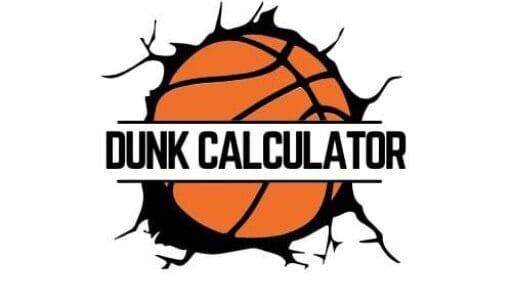Stepping into the world of beginner basketball coaching is both exciting and overwhelming. Whether you’re leading a team for the first time or helping out at local games, your influence shapes young players’ confidence, skills, and love for the sport. From understanding the basics to creating a solid youth basketball practice plan, there’s a lot to manage.
But don’t worry—you don’t need to be a pro to coach like one. With the right coaching mindset, clear guidance, and a focus on teaching basketball fundamentals, you’ll inspire growth on and off the court. This guide covers everything a first-time basketball coach must know to lead with confidence and impact.Understanding Youth Basketball Development by Age Group.
Core Principles Every New Basketball Coach Should Follow
The first rule of coaching youth basketball is to always focus on the kids. Your mission isn’t just to win but to develop character, teamwork, and skills. A strong coaching philosophy includes creating a safe, respectful space for all players. Keep things age-appropriate and let every child have time on the court.
One key to success is being patient and calm. Teaching takes time. Use repetition and praise to support player confidence building. Stick to your values, and let them guide your choices. As a coach, your tone and energy shape the whole team’s attitude. Stay calm, positive, and clear with instructions.
How to Plan Effective and Engaging Basketball Practices
A good youth basketball practice plan keeps kids active, focused, and learning without getting bored. Every session should include a warm-up, ball handling drills, shooting form for beginners, and some kind of fun game. Keeping kids moving with structure improves learning.
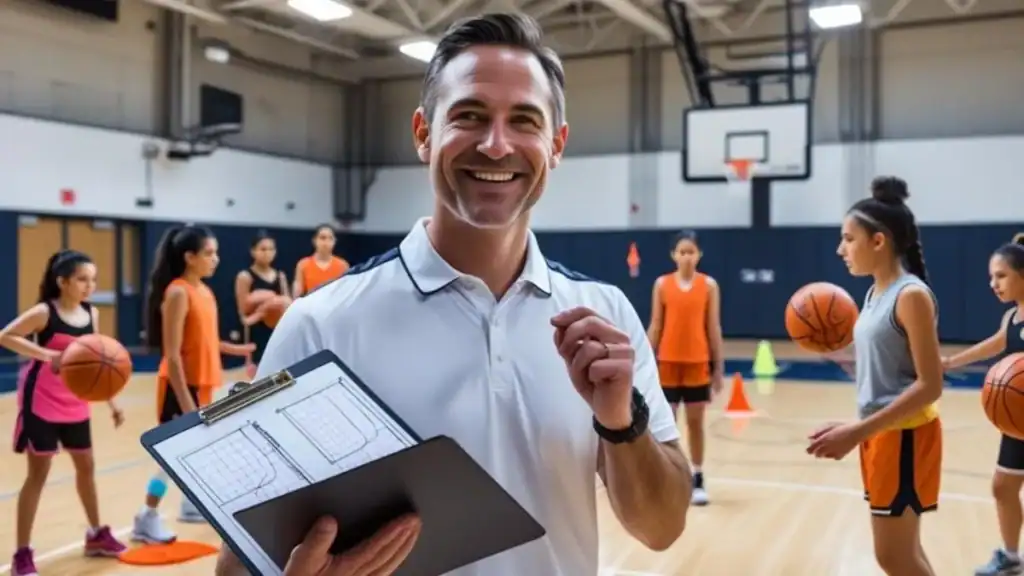
Your basketball practice structure should follow a pattern. Start with 10 minutes of warm-up, then 15 minutes of skills, 15 minutes of team drills, and 10 minutes of game-style play. A strong practice schedule for basketball improves focus and helps players know what to expect each time.
Motivating and Mentoring Young Players the Right Way
Keeping kids excited and confident can be tricky. Player motivation isn’t only about praise. It’s about being honest, kind, and consistent. A coach should always speak to the player, not just the athlete. Find what makes each child feel included.
Player confidence building happens when kids feel supported and challenged. When a child messes up, don’t yell. Ask what they noticed and help them correct it. Use your words to inspire, not just instruct. Positive coaching builds trust, and trust creates strong players.
Mistakes Every First-Time Basketball Coach Should Avoid
Many new coaches try to do too much too soon. Don’t flood kids with plays or hard drills. Avoid basketball progression levels that are too advanced. Kids don’t need to run plays like the pros. What they need is time to learn the basics.
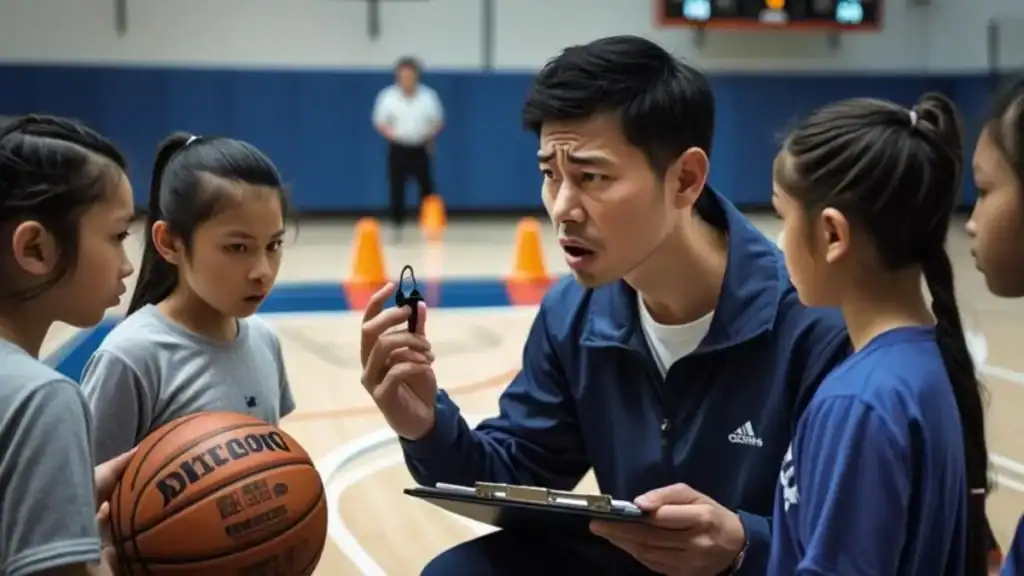
Also, don’t ignore your players’ emotions. If a child seems frustrated, pull them aside. Listen. Many basketball coaching tips for beginners say to coach the person, not just the sport. That’s especially true in youth basketball. The goal is progress, not perfection.
Coaching Mindset: Staying Positive and Resilient
A strong coaching mindset is about staying calm under pressure. Some days won’t go as planned. Maybe the kids are distracted or a game is lost badly. But your attitude teaches them how to react. Keep it steady, encouraging, and full of effort.
Focus on growth, not the scoreboard. Reflect after every practice and ask, “What went well? What can improve?” This makes your coaching more focused. Set a good example. Your energy shapes their experience. Stay joyful, even when mistakes happen.
Fun Games and Drills to Keep Kids Engaged
Kids learn best when they’re having fun. Use basketball drills for kids like Knockout, Red Light/Green Light Dribbling, or Passing Relays. These teach skills while keeping the mood light. It’s one of the best ways to help kids improve quickly.
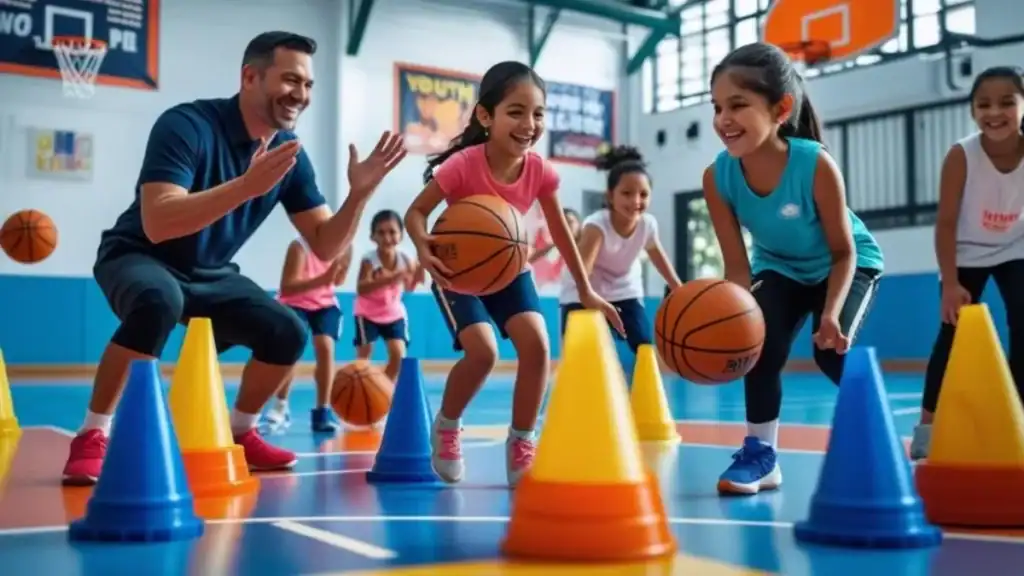
Incorporate short 5-minute breaks for games that use ball handling drills, shooting, and team movement. This builds footwork fundamentals and makes practice exciting. Fun drives engagement, and engaged players learn more.
Coaching Basketball from Pregame to Postgame
Game day is a chance to apply what’s been learned. Before the game, go over goals and remind players of your core values. Use short, clear phrases. During the game, keep calm. Use time-outs for teaching, not yelling.
After the game, always talk to the whole team. Win or lose, praise effort first. Point out one great thing each player did. Then ask, “What’s one thing we’ll work on next time?” That shows growth. It’s not just about the scoreboard.
Proven Youth Coaching Strategies That Actually Work
Sometimes less is more. Use 3 on 3 youth games instead of full 5-on-5 games. Fewer players mean more touches and faster learning. It also helps with spacing in basketball, teamwork, and reactions.
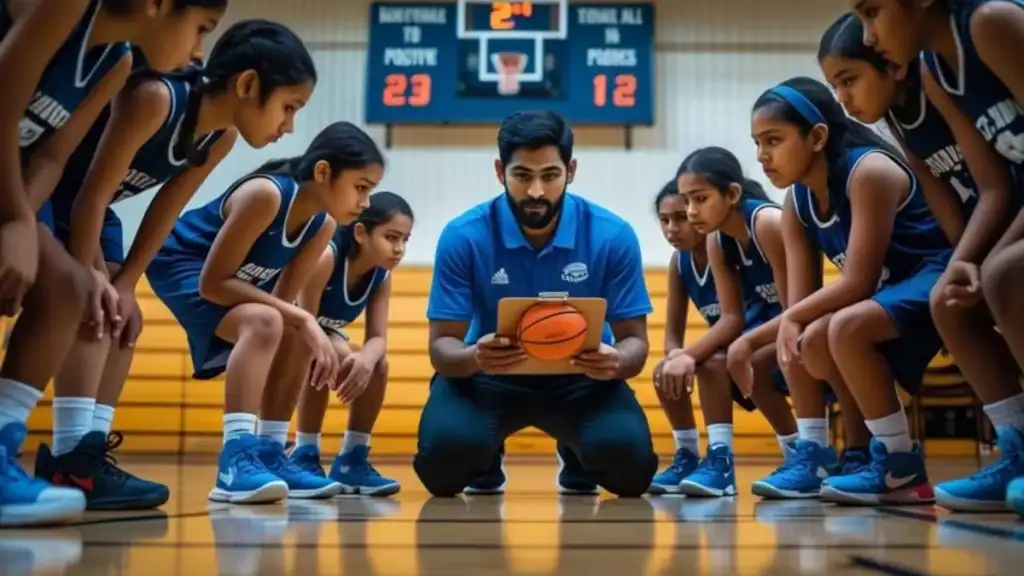
Also, avoid using zone defenses. Stick to man-to-man defense for youth. It teaches better awareness and movement. Many pro coaches recommend transition drills and motion offense for teaching smart positioning. Simpler is often smarter.
Table: Weekly Sample Youth Basketball Practice Plan (Ages 8–12)
| Time | Activity | Focus Area |
| 0–10 mins | Dynamic Warm-up | Movement skills for youth |
| 10–25 mins | Ball handling drills & Passing | Skill development stages |
| 25–40 mins | Shooting & Defense | Shooting form for beginners, defensive stance and slides |
| 40–50 mins | Team Game/Drill | 3 on 3 youth games, transition drills |
| 50–60 mins | Review & Motivation | Player confidence building, coaching mindset |
Final Thoughts
Being a great youth coach means more than teaching plays. It’s about building a team that supports each other, learns at the right pace, and has fun every step of the way. With the right tools, strong values, and smart plans, coaching youth basketball can be one of the most fulfilling roles you’ll ever take on. Stay positive, keep learning, and enjoy the journey.
FAQS
Q: How to be a coach in basketball with no experience?
A: Start by learning the rules, drills, and fundamentals of the game. Then, volunteer to coach local youth teams and focus on teaching basics.
Q: How do you coach an inexperienced basketball team?
A: Focus on teaching basketball fundamentals, build player confidence slowly, and use simple drills that encourage teamwork and basic skills.
Q: What should a beginner do in basketball?
A: A beginner should practice dribbling, passing, and shooting while learning how to move without the ball and play defense.
Q: How to coach a little kid in basketball?
A: Keep things fun and active, use short drills, and teach basic skills like ball handling and footwork in a positive, encouraging way.
Q: How do I start coaching basketball?
A: Begin by learning coaching techniques, understanding age-appropriate basketball training, and joining a local youth league or school team as a volunteer.
Q: What is a jump stop in basketball?
A: A jump stop is when a player jumps off one foot and lands on both feet at the same time to stop quickly without traveling.
